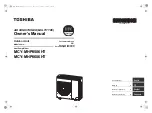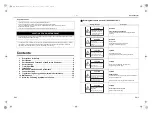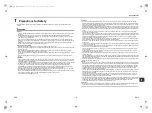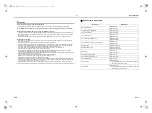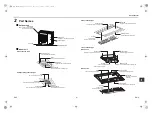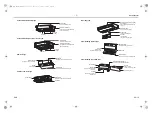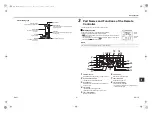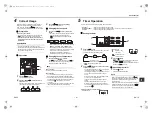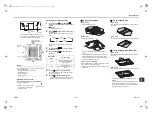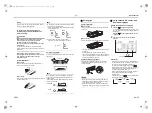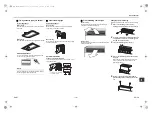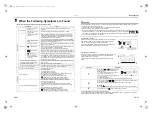
Owner’s Manual
– 2 –
EN
1
Precautions for Safety
The manufacturer shall not assume any liability for the damage caused by not observing the description of this
manual.
WARNING
General
• Carefully read Owner’s Manual before starting the air conditioner. There are many important things to keep in mind for daily
operation.
• Ask for installation to be performed by the dealer or a professional. Only a qualified installer is able to install an air
conditioner. If a non-qualified person installs an air conditioner, it may result in problems such as fire, electric shock, injury,
water leakage, noise and vibration.
• Do not use any refrigerant different from the one specified for complement or replacement. Otherwise, abnormally high
pressure may be generated in the refrigeration cycle, which may result in a failure or explosion of the product or an injury to
your body.
• Places where the operation sound of the outdoor unit may cause a disturbance. (Especially at the boundary line with a
neighbor, install the air conditioner while considering the noise.)
Transportation and storage
• When transporting the air conditioner, wear shoes with additional protective toe caps.
• When transporting the air conditioner, do not take hold of the bands around the packing carton. You may injure yourself if the
bands should break.
• When stacking the packing cartons for storage or transportation, heed the precautions written on the packing cartons.
Failure to heed the precautions may cause the stack to collapse.
• You shall ensure that the air conditioner is transported in stable condition. If you find any part of the product broken, contact
your dealer.
• When transporting the air conditioner, use a forklift and when moving the air conditioner by hand, move the unit with 5
people.
Installation
• Only a qualified installer or qualified service person is allowed to carry out the electrical work of the air conditioner. Under no
circumstances must this work be done by an unqualified individual since failure to carry out the work properly may result in
electric shocks and / or electrical leaks.
• After the installation work has been completed, have the installer explain about the circuit breaker positions. In the event that
trouble has occurred in the air conditioner, set the circuit breaker to the OFF position, and contact a service person.
• If you install the unit in a small room, take appropriate measures to prevent the refrigerant from exceeding the limit
concentration even if it leaks. Consult the dealer from whom you purchased the air conditioner when you implement the
measures. Accumulation of highly concentrated refrigerant may cause an oxygen deficiency accident.
• Do not install the air conditioner in a location that may be subject to a risk of expire to a combustible gas. If a combustible
gas leaks and becomes concentrated around the unit, a fire may occur.
• Be sure to use the company-specified products for the separately purchased parts. Use of non-specified products may result
in fire, electric shock, water leakage, etc. Have the installation performed by a professional.
• Confirm that earthing is performed correctly.
Operation
• Before opening the intake grille of the indoor unit or service panel of the outdoor unit, set the circuit breaker to the OFF
position. Failure to set the circuit breaker to the OFF position may result in electric shocks through contact with the interior
parts. Only a qualified installer or qualified service person is allowed to remove the intake grille of the indoor unit or service
panel of the outdoor unit and do the work required.
• Inside the air conditioner are high-voltage areas and rotating parts. Due to the danger of electric shocks or of your fingers or
physical objects becoming trapped in the rotating parts, do not remove the intake grille of the indoor unit or service panel of
the outdoor unit. When work involving the removal of these parts is required, contact a qualified installer or a qualified service
person.
• Do not move or repair any unit by yourself. Since there is high voltage inside the unit, you may get electric shock when
removing the cover and main unit.
• Use of a stand more than 50 cm high to clean the filter of the indoor unit or to carry out other such jobs constitutes working at
heights. Due to the danger of falling off the stand and injuring yourself while working at heights, this kind of work should not
be done by unqualified individuals. When this kind of work must be carried out, do not do it yourself but ask a qualified
installer or a qualified service person to do it for you.
• Do not touch the aluminum fin of the outdoor unit. You may injure yourself if you do so. If the fin must be touched for some
reason, first put on protective gloves and safety work clothing, and then proceed.
• Do not climb onto or place objects on top of the outdoor unit. You may fall or the objects may fall off of the outdoor unit and
result in injury.
• Do not place any combustion appliance in a place where it is directly exposed to the wind of air conditioner, otherwise it may
cause imperfect combustion.
• When the air conditioner is operated with a combustion appliance in the same place, be careful of ventilation to let fresh air
enter the room. Poor ventilation causes oxygen shortage.
• When the air conditioner is used in a closed room, be careful of sufficient ventilation of the room. Poor ventilation causes
oxygen shortage.
• Do not expose your body to cool air directly for a long time and do not cool yourself excessively. Doing so may result in
deteriorated physical condition and ill health.
• Never insert your finger or a stick into the air intake or discharge. Doing so may result injury as the fan is rotating at high
speed inside the unit.
• Consult the shop where you purchased the air conditioner if air conditioning (cooling and heating) is not performed properly
as a refrigerant leakage may be the cause. Confirm the repair details with a qualified service person when the repair includes
additional charging of the refrigerant.
• Be sure to stop running the air conditioner and turn off the breaker before cleaning. Otherwise, injury may result as the fan is
rotating at high speed inside the unit.
Repairs
• When you have noticed that some kind of trouble (such as when an error display has appeared, there is a smell of burning,
abnormal sounds are heard, the air conditioner fails to cool or heat or water is leaking) has occurred in the air conditioner, do
not touch the air conditioner yourself but set the circuit breaker to the OFF position, and contact a qualified service person.
Take steps to ensure that the power will not be turned on (by marking “out of service” near the circuit breaker, for instance)
until qualified service person arrives. Continuing to use the air conditioner in the trouble status may cause mechanical
problems to escalate or result in electric shocks, etc.
• If you have discovered that the fan guard is damaged, do not approach the outdoor unit but set the circuit breaker to the OFF
position, and contact a qualified service person to have the repairs done. Do not set the circuit breaker to the ON position
until the repairs are completed.
• If you have discovered that there is a danger of the indoor unit’s falling, do not approach the indoor unit but set the circuit
breaker to the OFF position, and contact a qualified installer or a qualified service person to refit the unit. Do not set the
circuit breaker to the ON position until the unit has been refitted.
• If you have discovered that there is a danger of the outdoor unit’s toppling over, do not approach the outdoor unit but set the
circuit breaker to the OFF position, and contact a qualified installer or a qualified service person to have the improvements or
refitting done. Do not set the circuit breaker to the ON position until the improvements or refitting is completed.
• Do not customize the unit. Doing so may result in fire, electric shock, etc.
Relocation
• When the air conditioner is to be relocated, do not relocate it yourself but contact a qualified installer or a qualified service
person. Failure to relocate the air conditioner properly may result in electric shocks and / or a fire.
EN-3
EN-4
1FAN_OM_EHV0000101-01.book Page 2 Thursday, September 13, 2018 5:10 PM

